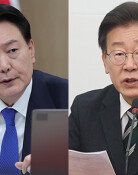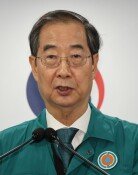Military and diplomatic power for Korean Peninsula
Military and diplomatic power for Korean Peninsula
Posted March. 02, 2018 08:12,
Updated March. 02, 2018 08:24
In a speech marking the Independence Movement Day Thursday, President Moon Jae-in said he would make the Independence Movement and the 100th anniversary of the establishment of the Republic of Korea a new start line in establishing a permanent peace structure. As President Moon has been arguing that South Korea's roots date back to the provisional government formed in Shanghai in 1919, his remark suggests that he aims to resolve the nuclear crisis with North Korea by the year 2019.
President Moon has also emphasized that we have the capability to bring peace by ourselves. This is his pledge to enable dialogue between North Korea and the United States when he is serving as a mediator between the two countries with the PyeongChang Winter Olympics as a momentum. In the same context, President Moon has stressed Korean people’s efforts to win their independence. “Their fight for independence was fiercer than any others,’” said the president. “Independence was not given from outside. It is the result of fighting for independence at the risk of their lives.”
The greatness of the March 1st movement, where 10 percent of the population took to the streets and fought for independence risking their lives, and struggle for independence regardless of ideology cannot be emphasized enough. But the current foreign and security issues surrounding the Korean Peninsula as well as the defeat of Japanese imperialism and the following independence of Korea are all product of the situation outside the country. That is why their solution should be worked out with allies and neighboring countries. The reason there was not even a hint of dialogue between North Korea and the United States during the Olympics despite President Moon’s efforts to make it happen is because the North Korean nuclear issue does not involve just the two Koreas, but also the United States and it is related to the denuclearization and nonproliferation of weapons of mass destruction around the globe.
Former presidents of Korea all presented permanent peace on the Korean Peninsula as their administration’s goal. Moon had also pledged to bring peace during his presidential campaign, and he presented five principles in establishing a permanent peace structure on the Korean Peninsula in July last year in Berlin. North Korean leader Kim Jong Un, however, went on with the sixth nuclear test two months later. President Moon may well be aware that declaring a peace structure without bearing any fruit in the move toward denuclearization is an empty rhetoric. There is a high hope for completing the construction of a joint community of peace and a joint economic community on the Korean Peninsula. But the Moon administration has not presented any roadmap for that goal yet. Having “the capability to bring peace by ourselves” is nice but what is more important is developing diplomatic and military power to bring peace on the Korean Peninsula.







